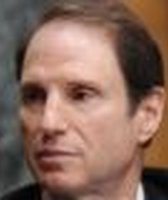Stand up for the facts!
Our only agenda is to publish the truth so you can be an informed participant in democracy.
We need your help.
I would like to contribute
SUMMARY: Sen. Barack Obama says his plans as president are 'paid for' with savings he'll find in other places in the budget, such as withdrawing from Iraq. But his lack of precise figures makes it hard to say if he's right.
Lately economists have been fretting about how the candidates' economic plans would affect the budget deficit, which has soared to $357-billion following several years of surpluses through 2001. So Sen. Barack Obama caught our attention when he laid out a laundry list of economic proposals in a speech on June 16, 2008, and said they were all "paid for."
Speaking at Kettering University in the faded manufacturing city of Flint, Mich., Obama ticked off several proposals he said would help working Americans:
"It starts with a broad-based, middle-class tax cut — $1,000 per family — to help offset the rising cost of gas and food," Obama said. "A foreclosure prevention fund, to help stabilize the housing market and keep people in their homes. A health care plan that lowers costs and gives those without health insurance the same kind of coverage that members of Congress have. A commitment to retirement security that stabilizes Social Security, and provides workers a means to increase savings. And a plan to crack down on unfair and sometimes deceptive lending in the credit card and housing markets, to help families climb out of crippling debt, and stay out of debt in the first place."
"Now these steps that I've proposed are all paid for," Obama said.
Sign up for PolitiFact texts
It's that last phrase we're interested in. We interpret it to mean Obama would do all that spending without increasing the budget deficit, and has detailed how he would do so.
Advisers and surrogates for Obama have said that more explicitly.
"He (Obama) has proposed an entire domestic program that would not increase the deficit at all over the course of his first term in office," his economic adviser Austan Goolsbee said in a conference call on June 9.
Obama "pays and proposes ways to pay for all of his tax cuts and all of his spending," his ally John Edwards said on the June 16 broadcast of ABC's This Week.
Let's start by looking at the specific programs Obama referred to. The "broad-based, middle-class tax cut" he spoke about referred to his "Making Work Pay" tax credit, plus a new income-tax exemption for seniors making under $50,000, his campaign said. Those together would cost about $80-billion a year, according to both the Obama campaign and the nonpartisan Tax Policy Center.
The "foreclosure prevention fund" would be a one-time cost of $10-billion, the campaign said. The health care plan, under which all Americans would be able to buy coverage similar to what members of Congress get, will cost some $50-billion to $65-billion per year, the campaign said. His aides said it's not clear how much stabilizing Social Security would cost, because both parties would have to hash out a plan to do so. His plan to help workers save is about a $20-billion-a-year program of employer mandates and tax credits.
Finally, there's his plan to crack down on unfair lending and to help families out of debt. That referred to regulatory changes, like a proposed rating system for credit cards and home loans, which the campaign said would not cost anything.
Now — does he have a plan to pay for all that spending?
Here's where it gets tricky. Some of the foreclosure-prevention fund would come from penalties on irresponsible lenders, the campaign's Web site says . The Social Security fix might be funded by more payroll taxes on high-earners, Obama has said.
But most of the money would come from what the campaign calls "baskets" of savings and new revenues. They include savings from a broad range of policy changes, such as ending the Iraq war, letting tax cuts expire for people who earn more than $250,000, closing corporate tax loopholes and discouraging offshore tax havens.
The campaign says all those changes would yield several hundred billion dollars a year. For example, ending the Iraq war — the first five years of which cost $600-billion, according to the Pentagon — would save between $90-billion and $100-billion a year, the Obama campaign asserts. All the savings together would be easily enough to pay for all the programs Obama mentioned, along with all the other new spending and tax cuts he plans, the campaign says.
But are Obama's savings estimates realistic? We don't know. The campaign has not provided enough detail to validate them, said Greg Leiserson of the nonpartisan Urban-Brookings Tax Policy Center.
"They (the policy changes) could raise a lot of money, they could raise a little money, we just don't know," said Leiserson, who co-wrote an analysis of both candidates' tax plans.
That undercuts Obama's claim that he has "paid for" his programs.
There's another problem. Current tax law calls for President Bush's tax cuts of 2001 and 2003 to expire at the end of 2010, and for the alternative minimum tax to be imposed on far more taxpayers than it is now. If that happened, the budget deficit would shrink and reach a surplus again by 2012, the Congressional Budget Office projects . (That projection assumes spending on existing programs, including the war in Iraq, continues, growing at the rate of inflation.)
But Obama's plan calls for the tax cuts to be extended for everyone who makes less than $250,000. Overall, his tax plan would decrease revenue by $2.7-trillion over the next 10 years, according to the Tax Policy Center analysis . That seems likely to yield a large deficit rather than a surplus. Obama could always close the deficit by cutting spending, but he has not spelled out how he would do so.
In fact, Obama's does not promise he won't leave a deficit. In interviews, his economic aides merely said he would leave less of a deficit than the $357-billion gap expected this year. They say that's the best measure of whether Obama's plan is "paid for." However, that the 2008 deficit is temporarily high because of a one-time economic stimulus.
It's true that Obama has outlined in very general terms where he would get the money to pay for his proposals. And it may be true that those proposals will leave the deficit smaller than it is now, though we can't say for sure.
More to the point, Obama can't say for sure. Until he fleshes out his economic plan considerably more, it's disingenuous to go around claiming his proposals are "paid for." And that claim is even more suspect considering that his proposals would leave a larger deficit than would the tax laws currently on the books. We find his claim to be Barely True.
Our Sources
YouTube, 'Change That Works for You' speech in Flint, MI
Congressional Budget Office, Selected Tables , April 4, 2008
Congressional Budget Office, The Budget and Economic Outlook: Fiscal Years 2008 to 2018 , January 2008
Conference call with Obama economic advisers Austan Goolsbee and Jason Furman, June 9, 2008
Background interviews with Obama economic aide, June 17 and 18, 2008.
This Week, Interview with John Edwards , June 16, 2008
Obama campaign, Obama Health Care Plan memo , February 2008
BarackObama.com, The Blueprint for Change, Barack Obama's Plan for America
BarackObama.com, Protecting Homeownership & Cracking Down on Mortgage Fraud
BarackObama.com, Plan to Strengthen Retirement Security
Interview with Greg Leiserson, research associate at the Urban-Brookings Tax Policy Center, June 17, 2008
The Urban-Brookings Tax Policy Center, A Preliminary Analysis of the 2008 Presidential Candidates' Tax Plans , June 11, 2008
Interviews with Brian Deese, deputy economic policy director for Obama, June 17 and 18, 2008
Interview with Melissa Merson, communications director of the Congressional Budget Office, June 19, 2008
New York Times, "Estimates of Iraq War Were Not Close to Ballpark," March 19, 2008



















































